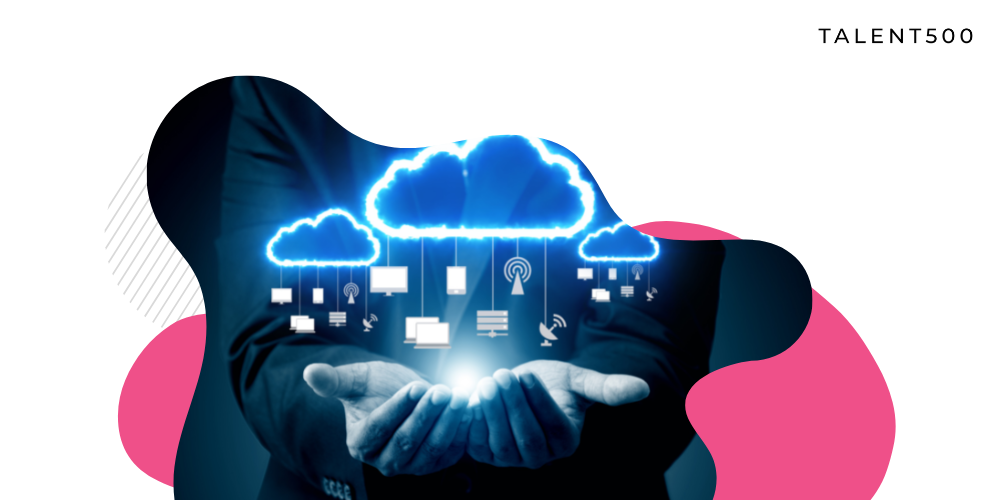Comparing cloud options in Backend: AWS vs GCP vs Azure
In the current digital Revolution landscape, the cloud market has witnessed tremendous growth. Currently, cloud technologies encompass a varying range of complex infrastructure, products, and customer services. The cloud market is estimated to grow into a US$1.3 billion industry by 2028.

Cloud Market Growth Rate (source: Statista)
Cloud computing has revolutionized the working style of organizations and advanced into an evolved technological era. The industry-leading and market-dominating cloud platforms include- Amazon Web Services (AWS), Google Cloud Platform (GCP), and Microsoft Azure.
Why Choose A Cloud Framework For Backend Programming?
With recent advancements in cloud technology, many software enterprises are highly inclined to adopt not just cloud infrastructure but multi-cloud and hybrid environments to harness the potential of cloud computing.
Some well-known and most prominent benefits of cloud infrastructure include:
- Reduced capital expenditure
- Decrease requirements of cost and resources for infrastructure maintenance
- Enhance availability
- Robust scalability

Cloud Services Market (source: Finances Online)
The Big 3 cloud platforms have the experience, ability, and expertise to provide reliable and feature-rich cloud infrastructure for backend programming.
However, there are certain differences in the features, functionalities, and offerings provided by AWS, GCP, and Azure. Therefore, before committing to a certain cloud platform, perform thorough and diligent research. Compare each platform to understand its capabilities and differences.
Still, trying to figure out where to start? We’re here to help! Keep reading to get a comparative analysis of the top 3 Cloud platforms- Google Cloud Platform (GCP), Amazon Web Services (AWS), and Microsoft Azure.
Amazon Web Services
Publicly launched in 2006, Amazon Web Services represents a subsidiary of amazon.com. Amazon Web Services provides an on-demand Cloud Computing platform not just for enterprises and government but also for individual developers. Choose a subscription model that suits your requirements.
Initially, in 2006 AWS started its venture into cloud computing technology by providing Elastic Compute Cloud (ECC), Simple Storage Service (popularly known as Amazon S3), etc. Later in 2009, Amazon launched a range of several other Cloud Computing services, including Elastic Block Store (EBS), Amazon CloudFront, Content delivery network (CDN), and more. Currently, AWS provides 200+ fully featured services to fulfill versatile demands and serve millions of users successfully.

AWS Market Growth (source)
| Fact check:
Amazon Web Services is the most primitive and experienced player in the cloud industry. As one of the oldest cloud services, AWS has garnered a tremendous user base, trust, and reliability factors. |
Google Cloud Platform (GCP)
A Google brainchild, Google Cloud Platform (GCP) presents a collection of cloud computing. GCP was initially conceptualized and launched in 2008 as an internal tool for Google projects. GCP was first publicly available in 2011. Since its inception, its popularity and range of services have evolved. Today, Google Cloud offers over 100+ products. Furthermore, currently, it’s the cloud service provider to 1000+ global clients. GCP tools help address some of the persistent business challenges, such as infrastructure modernization, data services management, data unification throughout an enterprise, etc.
Google Cloud Platform (GCP) primarily offers the following services:
- Data storage (Cloud Storage, Cloud Datastore, Cloud Spanner),
- Big data (BigQuery, Cloud Dataflow),
- Cloud-based artificial intelligence (Cloud Vision API, Cloud AutoML),
- Networking,
- Management.
There is a Google Cloud solution for almost any backend development case and purpose. With GCP, businesses can enjoy improved efficiency, enhanced process agility, reduced financial expenditure, greater expansion into new business models, and better opportunities to explore new market opportunities. Therefore, it’s no secret that GCP has become an absolute benefit for startups and established enterprises.
Microsoft Azure
Microsoft Azure is a comparatively younger platform launched publicly in 2010. Microsoft Azure has earned its name in the industry and become one of the favorite cloud platforms due to Microsoft’s legacy enterprise background and exceptional level of support. The most remarkable strength of Azure is the hybrid cloud platform that consistently works tirelessly to integrate with enterprises’ data centers. But that doesn’t mean Azure is only suitable for large enterprises. Young companies and startups can also benefit from Microsoft’s cloud computing services.
One of the most lucrative deals for startups includes 1 year of free Cloud Computing services on the Azure platform. As a young organization, you can develop and test your ideas before actually investing in a cloud computing service. The most prominent services of Microsoft Azure include Table and Blob Service for storage, communication services, virtual machines, data management solutions such as Azure stream analytics, StorSimple, Cosmos DB, infrastructure as a service (IaaS), etc.
Microsoft Azure services cater to several types of businesses, it and verticals in industry and innumerable locations across the globe.
Market Share
With an increased inclination toward cloud computing framework, the IaaS (infrastructure as a service) market is expanding with leaps and bounds. Since enterprises are wildly embracing cloud tech, the cloud computing market will experience a $136 billion upsurge by 2025.
This increased adoption rate is due to several benefits, including the elimination of backup issues, scaling barriers, server management concerns, and storage limits. Yes, cloud platforms have significantly progressed and advanced a long way from simply being just virtual machines to become treasure troves of services. With the global flourishing of the IaaS industry, the market demand for AWS, Azure, and Google Cloud will also see significant growth.
According to Statista, the 2021 market share of the key market players are as follows:
- Amazon Web Services — 32%
- Microsoft Azure — 19%
- Google Cloud Platform — 7%

Cloud Provider Global Market (source: Statista)
Although other players, including Alibaba Cloud and IBM Cloud, are closely following up at GCP’s heels, the trio of leaders has retained their position for the last ten years. Together, the top three market players captured 58% of the cloud computing market.
Services: AWS vs GCP vs Google
Amazon Web Services
| Backend Compute Services | Storage Services | Artificial Intelligence/ Machine Learning | Database Services |
|
|
|
|
Google Cloud Services
| Backend Compute Services | Storage Services | Artificial Intelligence /Machine Learning | Database Services |
|
|
|
|
Microsoft Azure
| Backend Compute Services | Storage Services | Artificial Intelligence /Machine Learning | Database Services |
|
|
|
|
Clients
| AWS | GCP | Azure |
| Netflix
Airbnb Coinbase Unilever Formula 1 Coca Cola Samsung Intuit Lyft BMW MI Coursera Zynga Food and Drug Administration (FDA) |
Toyota
20th Century Fox Nintendo Spotify Paypal The Home Depot Dominos Target Bloomberg UPS |
DAIMLER AG
McKesson Group Johnson Controls Asos Polycom Center for Disease Control (CDC) – US National Health Service (NHS) – UK Honeywell Starbucks Walgreens Apple HP Fujifilm Mitsubishi Electric Renault |
Pricing
AWS
Amazon pricing is complex. Although Amazon offers a cost calculator on its official website, several factors involved in the price calculation can make it challenging to understand the final amount or the exact estimates. Using a 3rd party cost management tool is advisable for a better understanding of the cost structure.
GCP
Google brings its A-game in the pricing structure. GCP brings cost-effective pricing structures that can easily beat its competitors. Google also utilizes deep discounts and flexible conditions to acquire different customer bases, especially those who’re new and not willing to spend a significant amount working on cloud infrastructure.
Azure
Microsoft Azure has a similar story to AWS. Due to Microsoft’s Complex software licensing alternative and situation-based discounts, sometimes its pricing structure can be challenging to understand without third-party consultations.
Availability Zones
The top three cloud infrastructure providers of services are in several areas of the globe, including North America, South America, Europe, and Asia. However, there are certain regions of the world where all three industry-leading cloud providers need to offer their services, e.g., Africa. Except for South Africa, Google and Azure don’t provide any services in the entire continent.

AWS vs GCP vs Azure: Availability Zones (source: Atomia)
Benefits and Drawbacks
AWS
| Benefits | Drawbacks |
|
|
GCP
| Benefits | Drawbacks |
|
|
Azure
| Benefits | Drawbacks |
|
|
Which One Should I Choose?
AWS is currently the oldest cloud provider in the market. For almost 10 years, it has maintained a dominant position in the industry in terms of capacity, global coverage, and included services. Microsoft Azure and Google Cloud are quickly gaining ground and closely competing with Amazon’s cloud platform.
There is no clear winner between AWS, Google Cloud, and Azure services. Rather each cloud provider has their own set of benefits and drawbacks. Only after analyzing their services, pricing, drawbacks, and benefits can you choose a cloud platform that best suits your project requirements.

Cloud Computing Overview and Stats. Source
You can also get a professional consultation before investing or migrating to a cloud solution, or developing an application.






Add comment